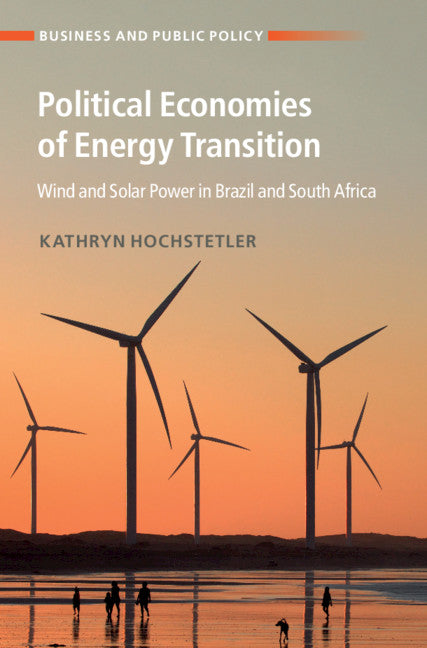Freshly Printed - allow 8 days lead
Couldn't load pickup availability
Political Economies of Energy Transition
Wind and Solar Power in Brazil and South Africa
Shows that economic concerns about jobs, costs, and consumption, rather than climate change, are likely to drive energy transition in developing countries.
Kathryn Hochstetler (Author)
9781108843843, Cambridge University Press
Hardback, published 26 November 2020
270 pages, 10 b/w illus. 2 tables
16 x 23.5 x 2 cm, 0.57 kg
'By one of the top scholars of political economy of development, this book masterfully compares solar and wind energy and their divergent development trajectories in Brazil and South Africa. Rather than by coherent plan, the shift to renewable energy is more likely, as Hochstetler deftly shows, to involve a series of political struggles by contending coalitions across different policy frames and types of renewable energy. Political Economies of Energy Transition is indispensable reading for students of renewable energy, climate change, and development policy generally.' Ben Ross Schneider, Ford International Professor of Political Science, Massachusetts Institute of Technology
Global climate solutions depend on low-carbon energy transitions in developing countries, but little is known about how those will unfold. Examining the transitions of Brazil and South Africa, Hochstetler reveals how choices about wind and solar power respond to four different constellations of interests and institutions, or four simultaneous political economies of energy transition. The political economy of climate change set Brazil and South Africa on different tracks, with South Africa's coal-based electricity system fighting against an existential threat. Since deforestation dominates Brazil's climate emissions, climate concerns were secondary there for electricity planning. Both saw significant mobilization around industrial policy and cost and consumption issues, showing the importance of economic considerations for electricity choices in emerging economies. Host communities resisted Brazilian wind power, but accepted other forms. Hochstetler argues that national energy transition finally depends on the intersection of these political economies, with South Africa illustrating a politicized transition mode and Brazil presenting a bureaucracy-dominant one.
1. Political economies of energy transition in Brazil and South Africa
2. Wind and solar power in the transition to a low-carbon economy
3. States, markets, and energy transition: good industrial policy?
4. Electricity consumption in Brazil and South Africa: distribution and prices
5. People and place: siting wind and solar plants in Brazil and South Africa
6. Political economies of energy transition.
Subject Areas: Environment law [LNKJ], Energy & natural resources law [LNCR], Political economy [KCP], Environmental economics [KCN], International relations [JPS], Comparative politics [JPB], Social theory [JHBA], History of ideas [JFCX]


